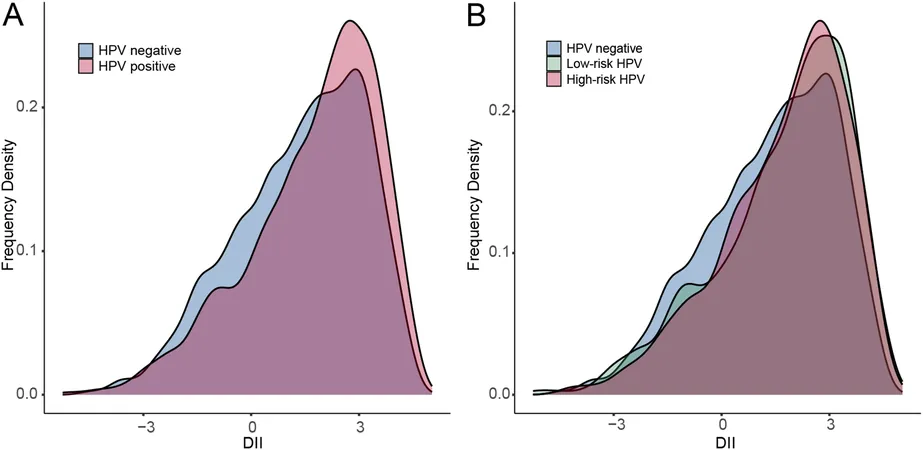
New Research Links Pro-Inflammatory Diets to Increased HPV Infection Risk Among Women
2024-11-01
Author: Nur
The Significance of Dietary Inflammation
The study focused on the Dietary Inflammatory Index (DII), a robust tool designed to assess the inflammatory potential of various diets. It categorizes foods based on their pro-inflammatory or anti-inflammatory properties. A higher DII score suggests an increased consumption of foods that could promote inflammation, which, as this research indicates, correlates with a heightened risk of HPV infection.
By examining a sample of 9,256 women aged 18 to 59, researchers found that those identified with HPV exhibited remarkably higher DII scores compared to HPV-negative women. The findings revealed that an increase in DII score was directly linked to the likelihood of HPV infection, underscoring the influence of dietary choices on immune responses.
Key Findings and Implications
Notably, the results demonstrated a U-shaped relationship between DII and HPV. As DII scores increased, the likelihood of infection rose sharply after reaching a critical point. This suggests that diets designed to minimize inflammation could reduce susceptibility to HPV and potentially prevent associated diseases, including cervical cancer—a serious health concern as HPV is a leading cause of this cancer.
Cervical cancer is responsible for 4.5% of all newly diagnosed cancer cases globally, predominantly caused by HPV. Understanding the dietary factors influencing HPV risks could be a game-changer in preventive healthcare strategies.
The findings also align with existing literature that connects chronic inflammation, often fueled by unhealthy eating habits such as high intakes of processed foods and sugars, to a broader spectrum of diseases, including various types of cancer. It's a wake-up call for improving dietary do's: embracing more whole foods, fruits, and vegetables while reducing processed foods can dramatically aid in lowering inflammation.
Lifestyle and Dietary Recommendations
Given the association observed, researchers suggest dietary interventions focusing on foods rich in antioxidants—like vitamins A, C, and E—could bolster the immune system against HPV. Regular consumption of fruits and vegetables is not just a tip for general well-being but could specifically mitigate HPV risks. For instance, diets high in folic acid have shown promise in reducing infection rates and even cervical cancer risks.
Future Direction in Research and Healthcare
This landmark study prompts a need for further research, particularly longitudinal studies that explore causal relationships between diet and HPV infection risk over time. Such investigations could set the stage for new dietary guidelines that empower women with knowledge about how their eating habits can directly influence their health and well-being.
In conclusion, as this research illustrates, a proactive approach to diet can create a formidable ally in the fight against HPV and its potential complications. With the majority of individuals unaware of the risks posed by a pro-inflammatory diet, this study serves not only as an informative piece but as a rallying call for public health initiatives promoting better dietary choices.
By prioritizing nutrition as a pivotal component of healthcare, we could drastically improve women's health outcomes and reduce the prevalence of HPV-related diseases. After all, a proactive dietary approach could be the first step in steering the conversation about HPV prevention toward the kitchen table.



 Brasil (PT)
Brasil (PT)
 Canada (EN)
Canada (EN)
 Chile (ES)
Chile (ES)
 España (ES)
España (ES)
 France (FR)
France (FR)
 Hong Kong (EN)
Hong Kong (EN)
 Italia (IT)
Italia (IT)
 日本 (JA)
日本 (JA)
 Magyarország (HU)
Magyarország (HU)
 Norge (NO)
Norge (NO)
 Polska (PL)
Polska (PL)
 Schweiz (DE)
Schweiz (DE)
 Singapore (EN)
Singapore (EN)
 Sverige (SV)
Sverige (SV)
 Suomi (FI)
Suomi (FI)
 Türkiye (TR)
Türkiye (TR)